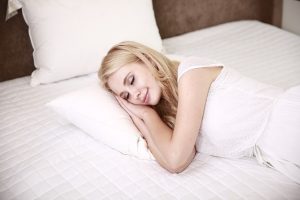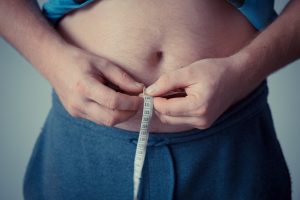You have never considered what are the symptoms of sleep apnea, but now find yourself waking up in the middle of the night by a choking sensation? Or, maybe, you experience daytime drowsiness when at work? You may be suffering from sleep apnea. This is a condition that hinders your ability to sleep and is linked to heart failure and disease, memory problems, and other health issues. That’s why it’s important to understand what sleep apnea is, what the symptoms include, and how you can combat the condition with effective treatments.
Everything You Need to Know about What are the Symptoms of Sleep Apnea
Sleep apnea disorders impede airflow during sleep, making it potentially dangerous if not treated. To determine if you have the condition, there are a number of common symptoms of sleep apnea and warning signs that you need to look out for:
 Insomnia or recurrent awakenings
Insomnia or recurrent awakenings- Restless sleep
- Lack of energy or daytime sleepiness
- Falling asleep while driving
- Loud snoring
- Waking up with dry mouth or a sore throat
- Waking up with choking sensations
- Morning headaches
- Mood swings, forgetfulness, and a decreased interest in sex
Once you understand what are the symptoms of sleep apnea, and find yourself (If you are) experiencing any of the below issues you should contact your dentist for an examination and discuss potential treatment options if sleep apnea is detected:
Interrupted Breathing During Sleep
One of the common signs of sleep apnea is interrupted breathing during sleep. If you are constantly startled awake in the middle of the night, this could be an indication. Some people are not even aware that this is happening to them but suspect that they may be suffering from interrupted breathing patterns through other symptoms. Regardless, it’s best to talk to your dentist about it.
Daytime Exhaustion
Another sign that you have sleep apnea is if you’re experiencing constant exhaustion and sleepiness during the daytime. Being continuously woken during the night can prevent you from having a good night’s rest. This can leave you feeling tired throughout the day and can also result in serious difficulties when trying to concentrate.
Loud Snoring
Snoring has been commonly attributed to this sleeping disorder as well. When the airways become restricted due to overrelaxation of the muscles, snoring occurs. Not only can it keep you awake at night, but it can also prevent your partner from getting a good night’s rest also.
Dry Mouth
If you’ve constantly been waking up in the morning with a dry mouth and throat, it’s likely been caused by open mouth breathing during the night. When the airways close up, your body does everything it can to increase oxygen, which includes breathing through your mouth. Mouth sores and sore throats are also common symptoms for those who suffer from sleep apnea.
Choking Sensations
Sleep apnea often causes patients to experience choking and gasping sensations and stop breathing while sleeping. When the oxygen levels become too low, and the brain is unable to receive as much oxygen as it needs, your body reacts by jolting you awake to breathe in more air.
Other Symptoms
There are also a number of other symptoms that you should talk to your dentist about. If you know what are the symptoms of sleep apnea and notice yourself suffering from night sweats, erectile dysfunction, or unexplained high blood pressure, it’s important to bring up your concerns at your next dental visit.
What is the Main Cause of Sleep Apnea?
Obstructive sleep apnea OSA has a variety of possible causes. The most common cause of sleep apnea in adults is obesity or excessive body weight, which increases the amount of soft tissue in the throat and mouth. When the person is asleep, tongue and throat muscles are more relaxed, and this soft tissue can block the airway, resulting in interrupted breathing patterns.
In children, sleep apnea causes often include enlarged adenoids or tonsils, as well as dental conditions, such as a large overbite. Other less common conditions are tumors in the airway and birth defects, such as Pierre Robin Syndrome or Down Syndrome. With Down Syndrome, the tongue, tonsils, and adenoids are enlarged, while the muscle tone in the upper airway is decreased. Children suffering from Pierre-Robin Syndrome have a smaller lower jaw, which makes the tongue “ball up” and fall to the back of the throat.
Even though childhood obesity may cause sleep apnea, it is a lot less common to cause the condition than adult obesity.
Sleep Apnea Risk Factors
One of the major risk factors for sleep apnea is the excess body weight. An overweight or obese person is much more likely to suffer from sleep apnea. Nevertheless, slim people may have the condition as well. Common sleep apnea risk factors include:
 Excess weight. People that are obese with a body mass index (BMI) of 30 and abover or even overweight with a BMI of 25 and higher have a greater chance of developing sleep apnea.
Excess weight. People that are obese with a body mass index (BMI) of 30 and abover or even overweight with a BMI of 25 and higher have a greater chance of developing sleep apnea.- Middle age. Sleep apnea can happen to anyone, at any age. However, it is a lot more common between young adults and middle age people.
- Large neck circumference. The risk of sleep apnea increases if your neck size is above 16 inches for women and above 17 inches for men. A bigger neck has more soft tissue that can potentially block the airway while you sleep.
- Male gender. Men are more likely to suffer from sleep apnea as compared to women. For women, the sleep apnea risk increases with menopause.
- Family history. Sleep apnea is heritable, meaning that you will have a higher risk of sleep apnea if one or more of your family members already suffers from it. Some of the inherited traits that increase the risk are obesity and some physical features, such as a large neck or a recessed jaw. Other family factors, such as eating habits or physical activities, also play a role.
- Hypertension. Increased blood pressure is very common in people with sleep apnea condition.
How to Test for Sleep Apnea?
When you understand what are the symptoms of sleep apnea and notice one or more of sleep apnea symptoms, you may want to consider performing a sleep study or test for sleep apnea. Such evaluations involve overnight monitoring of your body functions while you sleep. Tests to detect sleep apnea include:
- Home sleep tests. You can ask your doctor for a simplified test to be used at home. Such tests measure your blood oxygen level, heart rate, breathing patterns, and airflow.
- Nocturnal polysomnography. During the test, you will be connected to equipment that monitors your lung, brain, and heart activity, arm and leg movements, breathing patterns, and oxygen levels in your blood while you sleep.
Sleep Apnea Treatment Options
Regardless of what are the symptoms of sleep apnea that you suffer from, it is crucial to contact a sleep apnea specialist, such as Rockcliffe Dental & Denture Centre.
At Rockcliffe Dental, we offer our patients a non-surgical solution for mild to moderate sleep apnea. If our examination indicates that you have the condition, we will recommend a dental appliance called at Jaw Advancing Device (JAD) or Mandibular Advancement Advice (MAD) to help open the airways while you sleep.
For those with mild to moderate sleep apnea, dental devices have been proven to improve and control sleep more effectively than the standard surgical procedure for apnea. Our devices are also more likely to be used than CPAP machines that tend to be clunky and uncomfortable to wear, making devices a better long-term solution.
The way a dental appliance works to cure sleep apnea is by moving the jaw slightly forward to increase the size of the airways. This can prevent your throat from abruptly closing while helping to reduce any loud snoring. To make sure that your dental appliance fits comfortably, we will custom-design the mouth guard so that it will sit snug in your mouth. In fact, our sleep apnea appliances are comfortable to wear, and you’ll barely notice it’s even there once you get used to it.
We offer a number of dental appliance options to ensure that our proposed solution fits within your budget. The best treatment will depend on a number of factors, including the severity of your condition, the structure of your upper airway and your personal preference. Our team will be happy to book you in for a consultation to review your best options.
Contact Rockcliffe Dental Immediately if You Experience Symptoms of Sleep Apnea
Once you understand what are the symptoms of sleep apnea, you may want to talk to your dentist about it. Obstructive sleep apnea may affect anyone – children and adults, both men and women. If you think sleep apnea is impacting your life, don’t delay!
Contact us at Rockcliffe Dental for an appointment, and we’ll help you get back to normal in no time.
- Learn more about sleep apnea treatment in Ottawa
- Learn why sleep apnea affects more than just sleep quality